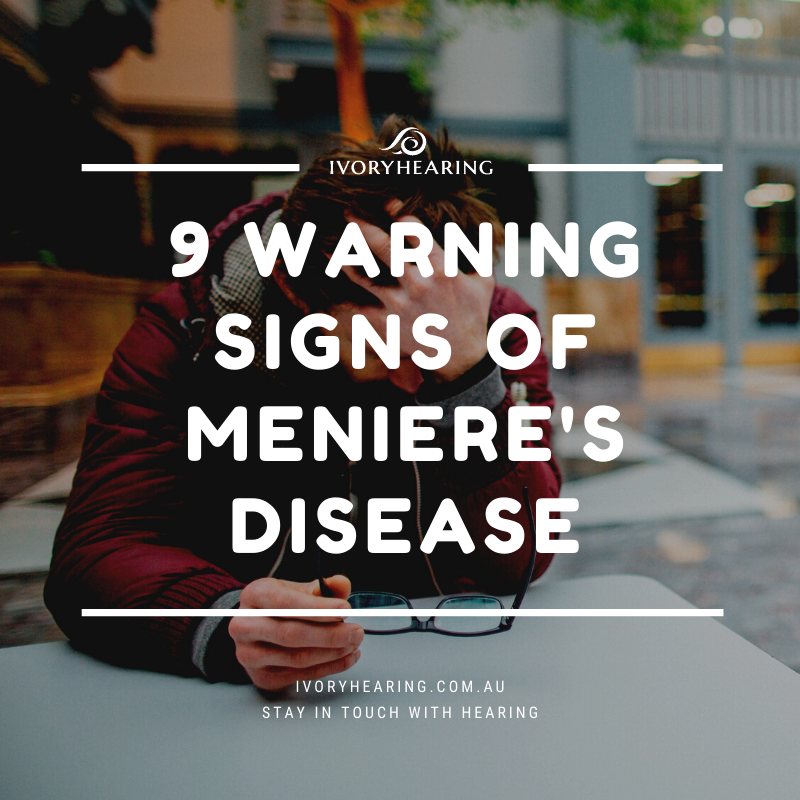Meniere’s Disease is a chronic inner ear disorder that causes fluctuating hearing loss, vertigo and tinnitus due to the buildup of fluid in your inner ear. The cause of the disease is unknown. Researches are being done to test various proposed hypothesis, but so far. none is conclusive. Although there is no identified cure for Meniere’s Disease, many treatments are used to manage the disease by reducing the severity and the frequency of attacks.
For early detection and treatment, watch out for these 10 warning signs of Meniere’s Disease. If you experience any one of them, please consult your GP, Ear Nose Throat (ENT) specialists or an Audiologist like us.
1. Dizziness
Your inner ear is not only responsible for hearing, but also for your sense of balance. When Meniere’s Disease attacks your inner ear, the most common symptoms you would feel is dizziness, often severe enough to be temporarily disabled. You may sense that the world is spinning, twisting or rocking around you. The sensation can last from a few minutes to several hours. If you are experiencing dizziness, get it diagnosed as soon as possible, because dizziness could also be caused by many other diseases, not just Meniere’s Disease.
2. Nausea
Nausea is one of the common symptoms of Meniere’s Disease. Feeling sick to the stomach and vomiting will quickly occur, sometimes as little as half an hour, but other times, as long as 24 hours. While the effects of nausea are very uncomfortable and inconvenient to handle, there are over-the-counter medications you can buy for motion sickness. You can also get your GP to prescribe anti-nausea drugs. There are also some antibiotics that can be injected into your ears to help relieve the symptoms.
3. Hearing Loss
When you have Meniere’s Disease, you could get blocked feeling in the infected ear. Usually the hearing loss is temporary, but eventually you could get permanent hearing loss. The sound that you hear can seem distorted, fuzzy, far away, or even tinny. Sensitivity to sound is also quite common. Removing the fluid from the infected ear can help improve the hearing problems that you experience.
4. Ringing In the Ear (Tinnitus)
Meniere’s Disease can also cause tinnitus. Some people describe it as ringing, hissing, roaring, buzzing, whistling or a combination of these sounds in your ear. The tinnitus may be relentless, or fade in and out. The volume of the tinnitus varies too, and often increases before a Meniere’s attack. Although not painful, tinnitus can be really difficult to deal with.
5. Uncontrolled Eye Movements
Many people who have Meniere’s Disease experience some sort of uncontrollable eye movement in one or both eyes. The movement could be side to side, up and down, or in a circular motion. It varies between each individual and each attack. Your inner ear directly affects your balance, which in turn, the movement of your eyes. Tests can be done to check the response of your eyes when your inner ear balance is changed.
6. Diarrhoea
Diarrhoea can often occur during and after a Meniere’s attack. This makes it very important for you to stay hydrated because the combination of vomiting and diarrhoea will make you extremely dehydrated. If you are too dehydrated, it can lead to other health problems. Apart from diarrhoea, you might also experience abdominal pain and other gastrointestinal discomfort.
7. Cold Sweats
During the middle of a Meniere’s attack, you could also develop cold sweats, adding another uncomfortable symptom to deal with. Cold sweats normally occurs as a result of vertigo. Therefore, vertigo medication could help greatly in eliminating or reducing this problem and other vertigo symptoms. Your doctor might also prescribe an anti-nausea medication if the symptoms of the attack become too severe.
8. Fatigue
Those with Meniere’s disease could be more sensitive or susceptible to fatigue, increasing the risk of falling prey to an attack. You should adjust your lifestyle as needed to reduce the risk of becoming too tired. You should also work on sleeping well and not over-working or over-extending your capabilities.
9. Migraines
Severe migraine is an easily overlooked symptom of Meniere’s Disease, because it is linked to so many other conditions. Migraines can cause damage to the inner ear, and those with Meniere’s disease are likely to get migraines during flare ups.
What next?
Even though there’s no definite cure for Meniere’s Disease, there are many strategies you can consider to reduce your symptoms. For most people, spontaneous remission is common, even if it might take years. Our audiologist can give you professional advice and help find a manageable solution that’s right for you. Contact us for a consultation.
[x_share title=”Share this Post” facebook=”true” twitter=”true” linkedin=”true” pinterest=”true” email=”true”]
There are no comments

